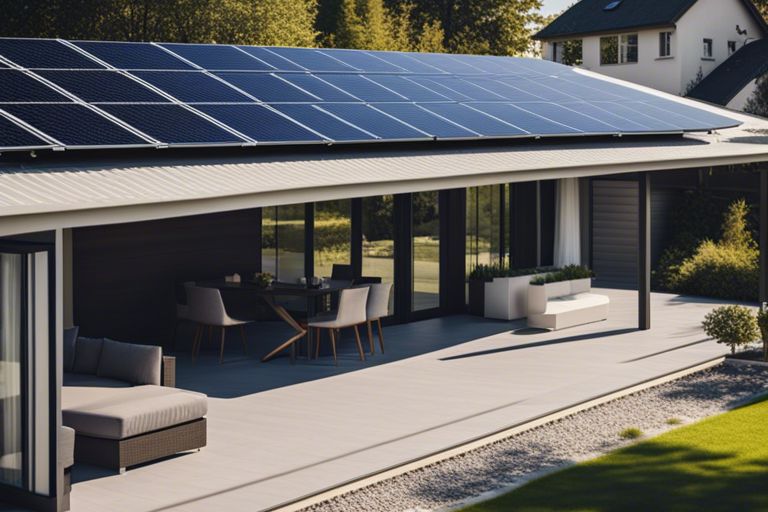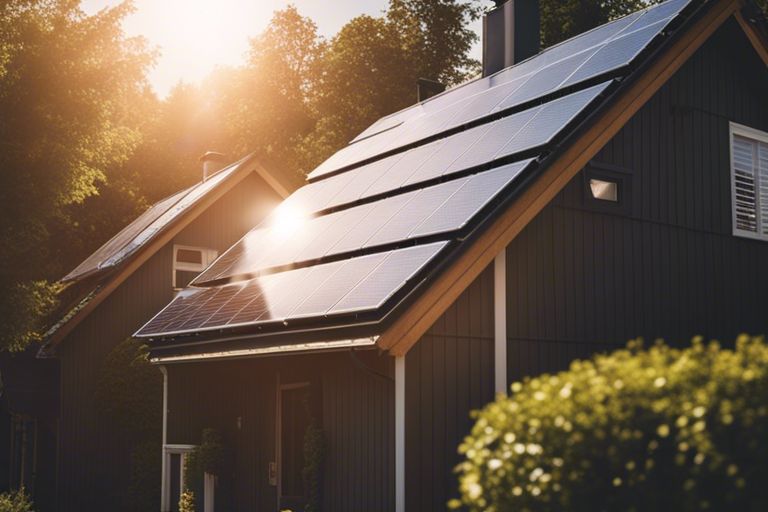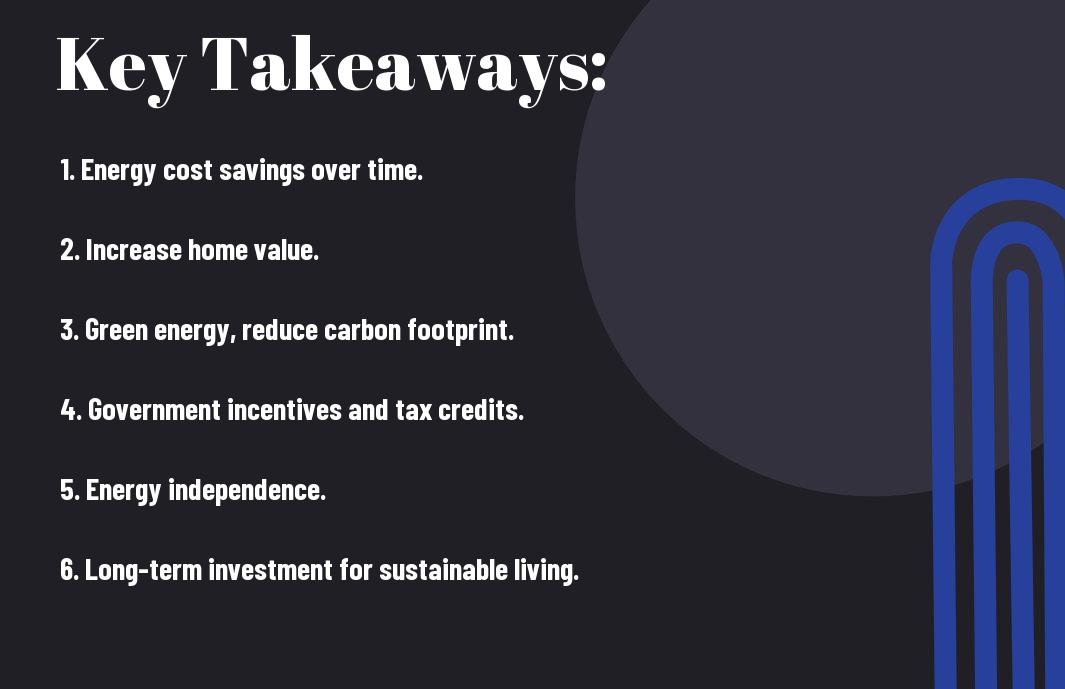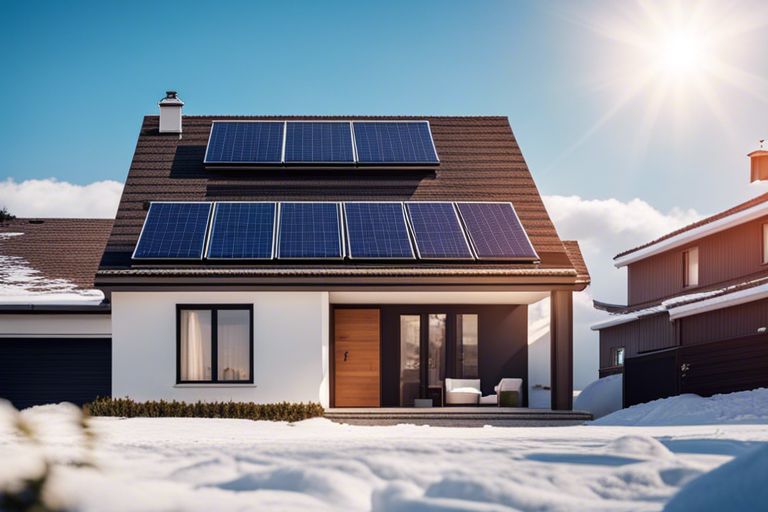Solar panels have been a hot topic in the world of sustainability and energy efficiency. You may be wondering, are solar panels on a house really worth it? In this informative blog post, we will probe into the benefits of installing solar panels on your home, including cost-saving opportunities, environmental impact, and the potential increase in property value. By the end of this article, you will have a clearer understanding of whether investing in solar panels is the right choice for you and your household.

Key Takeaways:
- Financial Benefits: Solar panels on a house can lead to significant long-term savings on electricity bills due to reduced dependence on the grid.
- Environmental Impact: Investing in solar panels helps reduce carbon footprint and contributes towards a more sustainable future by using clean, renewable energy.
- Property Value: Homes with solar panels tend to have higher property values and can be more attractive to potential buyers, offering a return on investment if the house is sold.
The Benefits of Solar Panels
For Are Solar Panels Worth It?, solar panels offer a variety of benefits that make them a worthwhile investment for your home.
Environmental Impact
Environmental benefits are one of the significant advantages of installing solar panels on your house. By harnessing the power of the sun, you can significantly reduce your carbon footprint and dependence on fossil fuels. Solar energy is a clean and renewable energy source, which means that when you use it to power your home, you are actively contributing to a more sustainable future for the planet.
Cost Savings
The cost savings associated with solar panels are another compelling reason to consider investing in them. Not only can solar panels help reduce your monthly electricity bills, but some regions also offer financial incentives such as tax credits or rebates for installing solar panels on your home. Over time, the savings on your energy bills can help offset the initial investment in solar panels, making them a cost-effective choice for homeowners.
Impact on your Wallet
The Drawbacks of Solar Panels
High Upfront Costs
It can be daunting to consider the initial investment required for solar panels on your house. Any homeowner looking to go solar must be prepared for the high upfront costs associated with purchasing and installing a solar panel system. While there are incentives and rebates available to help offset some of these costs, the overall price tag can still be significant. If you’re unsure about the financial implications, you can check out Was Solar worth it? : r/solar for experiences shared by other homeowners who have already made the switch to solar.
Intermittent Energy Source
Upfront, it’s crucial to understand that solar energy is an intermittent source of energy. While solar panels can generate electricity during the day when the sun is shining, they are unable to produce energy at night or during periods of heavy cloud cover. This means that your energy production will fluctuate depending on the weather and time of day. To mitigate this issue, you may need to invest in a battery storage system to store excess energy generated during peak sunlight hours for use when sunlight is not available.
To ensure a constant and reliable energy supply, you may need to stay connected to the traditional power grid as a backup source of electricity. While being grid-tied can provide peace of mind, it also means you may not achieve complete energy independence as originally envisioned.

Assessing Your Energy Needs
Now, before you decide if solar panels are worth it for your home, you need to assess your energy consumption.
Evaluating Your Energy Consumption
Assessing how much energy your household uses on a daily basis is crucial in determining if solar panels are a good investment for you. Look at your past energy bills to get an idea of your average monthly usage. Consider factors such as the size of your home, the number of occupants, and your daily habits that may affect energy consumption. This evaluation will give you a clear picture of how much electricity you need to generate from solar panels to meet your energy needs.
Determining Your Solar Potential
Your home’s location and the amount of sunlight it receives are key factors in determining your solar potential. Homes in areas with abundant sunshine will benefit more from solar panels than those in shady or overcast regions. Additionally, the orientation and angle of your roof, as well as any obstructions like trees or buildings that may cast shadows, will impact how much sunlight your solar panels can capture.
When assessing your solar potential, consider factors such as the direction your roof faces, the tilt of your roof, and any shading that may affect sunlight exposure. You can also consult with a solar energy provider to conduct a site assessment to determine the best placement for solar panels on your property.
The Cost of Solar Panels
Keep Are Solar Panels Worth It (2024 Guide)? in mind as you consider the cost of solar panels for your home.
Initial Investment
The initial investment in solar panels can vary depending on factors like the size of your home, energy needs, and the type of panels you choose. While the upfront cost may seem significant, remember that solar panels are a long-term investment that can save you money in the future.
Long-term Savings
Solar panels can lead to significant long-term savings on your energy bills. By generating your electricity, you can reduce or even eliminate your monthly energy costs. Additionally, if your panels produce more energy than you use, you may be able to sell the excess back to the grid, further increasing your savings.
A key point to consider is that the savings from solar panels can accumulate over time, offsetting the initial investment and eventually leading to substantial financial benefits.
Incentives and Rebates
Initial incentives and rebates can help offset the cost of installing solar panels. Depending on your location, you may be eligible for federal or state incentives, tax credits, or rebates from utility companies. These financial incentives can make solar panels a more affordable option for your home.
Rebates can significantly reduce the upfront cost of solar panels, making them a more attractive investment. Be sure to research the incentives and rebates available in your area to maximize your savings when going solar.
The Installation Process
Despite the initial costs and considerations, the installation process for solar panels on your house can be a smooth and efficient experience. From choosing a solar panel provider to understanding the installation timeline and logistics, it’s imperative to have a clear understanding of each step to make the most out of your solar investment.
Choosing a Solar Panel Provider
Choosing a reputable and experienced solar panel provider is crucial for a successful installation. Look for companies with a proven track record, positive customer reviews, and certifications. Getting multiple quotes and comparing services can help you make an informed decision that aligns with your budget and energy needs.
Installation Timeline and Logistics
Solar panel installations typically take a few days to complete, depending on the size of your system and the complexity of the installation. The process involves a site assessment, obtaining necessary permits, installation of the panels and inverters, and connecting your system to the grid. Make sure to coordinate with your provider for any specific requirements or logistics to ensure a seamless installation.
To maximize the efficiency of your solar panel installation, it’s imperative to have a clear understanding of the installation process and work closely with your chosen provider to address any concerns or questions you may have along the way.
Maintenance and Upkeep
Cleaning and Inspection
To ensure the efficient operation of your solar panels, it’s necessary to keep them clean and well-maintained. On a regular basis, you should inspect your panels for any dirt, debris, or shading that may affect their performance. Cleaning your solar panels can be as simple as using a hose and mild detergent to wash away any grime that has accumulated. By keeping them clean, you’ll maximize their energy production and extend their lifespan.
Warranty and Repair Options
On the topic of warranty and repair options, it’s crucial to understand the coverage provided by your solar panel manufacturer. Most solar panels come with a warranty ranging from 20 to 25 years, ensuring that you are protected in case of any manufacturing defects or performance issues. In case you encounter any problems with your solar panels, reaching out to the manufacturer or installer for repair services should be fairly straightforward.
Plus, some companies offer extended warranties or service plans for an additional cost, providing you with extra peace of mind and protection for your investment in solar energy. It’s worth exploring these options to safeguard your solar panel system for years to come.

Conclusion
So, are solar panels on a house really worth it? The answer ultimately depends on your specific circumstances and goals. While solar panels can help reduce your electricity bills and decrease your carbon footprint, the upfront costs and potential maintenance involved should be carefully considered. It’s important to weigh the financial savings over time against the initial investment, as well as any incentives or rebates that may be available in your area. Additionally, factors like your home’s location, energy consumption, and the amount of sunlight it receives will all play a role in determining the overall value of installing solar panels.
Ultimately, taking the time to research and evaluate your options thoroughly will help you make an informed decision about whether solar panels are a worthwhile investment for your home. By considering your energy needs, the environmental impact, and the financial implications, you can determine whether the benefits of solar panels align with your priorities and contribute to a more sustainable future for you and your community.
Q: Are solar panels on a house really worth it?
A: Yes, solar panels on a house can be worth it in the long run. While the initial cost of installation can be high, you can save money in the long term by generating your own electricity and potentially even selling excess energy back to the grid.
Q: How much can I save with solar panels on my house?
A: The amount you can save with solar panels depends on various factors such as your location, the size of your system, and your energy usage. On average, homeowners can save thousands of dollars over the lifetime of their solar panels through reduced energy bills and potential tax incentives.
Q: Are there any other benefits to installing solar panels on my house?
A: In addition to saving money on electricity bills, there are other benefits to installing solar panels on your house. These include reducing your carbon footprint, increasing the value of your property, and gaining energy independence. Solar panels can also protect you from rising electricity costs in the future.
